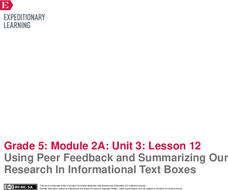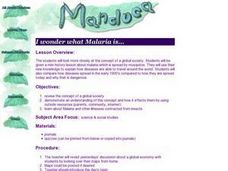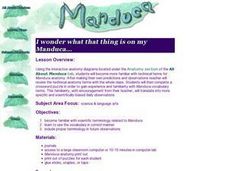Insect Teacher Resources
Find Insect lesson plans and worksheets
Showing 3,291 resources
Deep Look
The Double-Crossing Ants to Whom Friendship Means Nothing
I'll scratch your back, if you'll scratch mine—unless someone else comes along that is a better scratcher! Examine the fickle nature of rainforest insects using a captivating video. The narrator describes the mutualistic relationship...
The Brain Scoop
Chicago Adventure, Part 7: Octopus Sex
Octopi transfer sperm by a modified arm tip. Other interesting and weird facts about octopus sex in included in an intriguing video. Brain Scoop presents the seventh part of a series on an adventure at the Field Museum as part of its...
The Brain Scoop
The Case for Saving Parasites
One study found there could be as many as 30,000 species of parasitic worms. Very few scientists study parasites, yet the need for a better understanding continues to prove itself. Brain Scoop presents a strong case for studying and...
The Brain Scoop
Moths vs Butterflies
What's the difference between a chrysalis and a cocoon? A chrysalis comes from the butterfly's skin, while a cocoon comes from any nearby materials a moth uses. The Brain Scoop video explains the similarities and differences between...
Kenan Fellows
Attack of the Aphids!
Insects threaten the food production industry, and aphids are one of the big players! Analyzing data of aphid populations gives insight into their behaviors. Learners model the population data of an uninhibited population with an...
Deep Look
A Baby Dragonfly's Mouth Will Give You Nightmares
Dragonflies have existed for more than 320 million years and used to have a wingspan of more than two feet. An informative video helps viewers understand the adaptations of this insect to survive longer than the dinosaurs, and their...
Deep Look
Praying Mantis Love is Waaay Weirder Than You Think
Some praying mantises find themselves decapitated and yet still find a way to actively mate. Learn more about these savage insects and why they behave this way. Viewers observe high detail, graphic videos of various mating scenarios...
The Brain Scoop
In Search of Night Life
Take a tour through the Amazon rain forest at night! A video leads an expedition through a rain forest highlighting the nocturnal wildlife. The participants find reptiles, arachnids, insects, and more during their journey.
ProCon
Daylight Savings Time
An entomologist named Geroge Vernon Hudson is credited with proposing Daylight Saving Time (DST) so he could better study his insects. Using the informative website, scholars read a brief introduction to the topic and then explore the...
Roald Dahl
James and the Giant Peach Lesson Plans
Immerse yourself in the world of giant bugs, rolling peaches, and brave little boys with an interdisciplinary unit on James and the Giant Peach. Young readers focus on the scientific themes of Roald Dahl's classic novel with bug hunts,...
Alabama Wildlife Federation
Itsy Bitsy Spider
Bring the outside in to make observations in a controlled environment. Pupils learn about predator-prey relationships with spiders firsthand. They first construct a spider habitat and then feed the spider insects to make observations...
Museum of Science
Nature Bingo
Hit the jackpot by playing nature bingo. Scholars go on a nature walk and record observations in their notebooks. They see how many types of trees and insects they observe and play a nature bingo game where they find different natural...
EngageNY
Using Peer Feedback and Summarizing Our Research In Informational Text Boxes
Insert text box here. Learners use index cards to create their own informational text boxes. The text box includes information about an insect in the rainforest. Scholars also complete the draft of their research science journal entries.
MinuteEarth
Who Are Flowers Trying to Seduce?
Learn the tricks plants use to attract insects and animals in their quest for pollination. A thorough video lesson describes plant adaptations that meet their reproductive needs. From bees to rodents to bats, the narrator describes how...
The Brain Scoop
The Naked Mole-Rat
The naked mole rat is truly unique! So unique, it was recently placed in its own family. What makes it so special? Discover its amazing story with a video from an exciting mammals playlist. A naked mole rat expert explains its...
Curated OER
Life Cycle of a Flowering Plant
The development of the male and female gametes in a plant is illustrated, explaining plant fertilization, pollination, and reproduction. Overall, get a complete picture of the life cycle of a flowering plant with some wonderful details...
Shmoop
ELA - Literacy.CCSS.ELA-Literacy.RST.9-10.6
Key to understanding scientific or technical texts is identifying the underlying question the author is attempting to answer. Provide your young scientists with an opportunity to practice identifying these questions and the procedures...
Curated OER
I Wonder What Would Happen if Lots of Manduca Lived in a Small Place...
Pupils discuss the reasons why humans fight and look for similiarties in animals. They make predictions on what they think will happen when they observe insect crowding. They make conclusions about their predictions to end the lesson.
Curated OER
I Wonder What Malaria is
Students examine the disease malaria. They compare how diseases were spread in the early 1900's compared to how they are spread today and discuss why that is dangerous. They take a survey to see how much they know about insects that...
Curated OER
Biodiversity
Fifth graders visit the playground to look for signs of life. They search for insects, birds, animal tracks, feathers, nests, trees, soil, etc. They then compose a class list that shows all findings in the schoolyard and post it in the...
Curated OER
In the Company of Wild Butterflies
Students discover the life cycle of a butterfly and explain the different stages. In this exploratory lesson students watch a video and create insect art and they will get an opportunity to view live specimens of butterflies.
Florida Center for Instructional Technology
Integrating Mathematics into Literature
You class will read Cucumber Soup by Vickie Leigh Krudwig as an anticipatory set for this lesson on ratios. They make models of the insects in the story and then use them as a source of data for this ratio and proportion lesson. This...
Curated OER
I Wonder What That Thing Is On My Manduca
Students use the internet to gather more information on the anatomy of the Manduca. They make predictions of what the insect will look like when it hatches and complete a crossword puzzle to practice their vocabulary. They continue to...
Curated OER
Animal Categories
Pupils sort animal picture cards into classification groups such as mammals, reptiles, amphibians, insects and fish. They discuss the characteristics that each group of animals shares then arrange the pictures into a clasificatioon poster.
Other popular searches
- Insects Science
- Insect Body Parts
- Bugs and Insects
- Insects Word Search
- Esl Social Studies Insects
- Insect Adaptations
- Beneficial Insects
- Insect Characteristics
- Insect Metamorphosis
- Insects Basic Needs
- Insects Crossword
- Rain Forest Insects

























